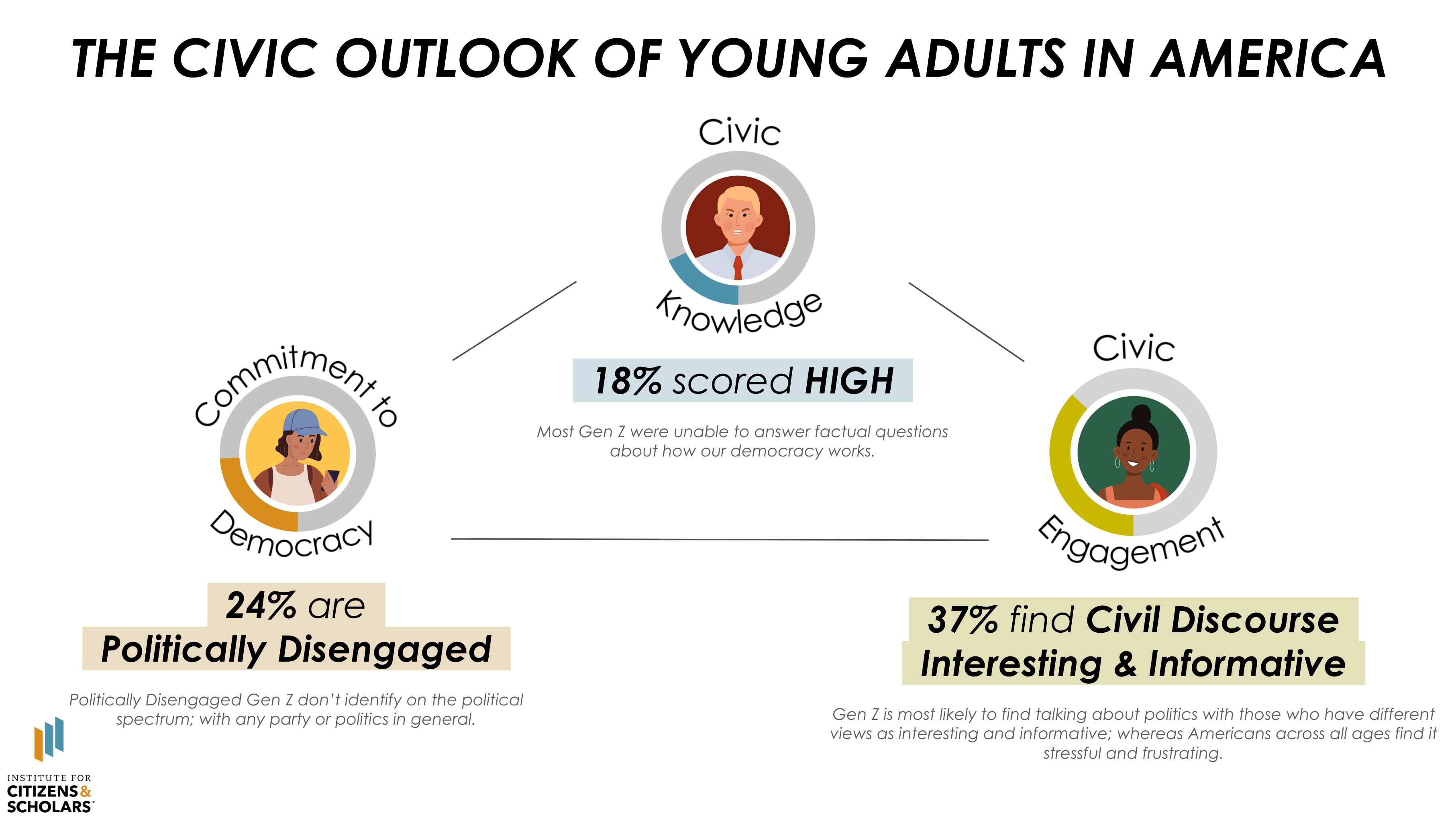Our New Survey Reveals Warning Signs for American Democracy–and Ways to Turn it Around
We Must Double Down on Youth Civic Readiness
September 21, 2023
Share

What do young adults think about America’s political system? How well do they know civics? How active are they in their communities? What political parties do they align with? To check the civic pulse of our young adults, the Institute for Citizens & Scholars commissioned a first-of-its-kind national survey of more than 4,000 Americans aged 18-24.
Conducted by Citizen Data in late August, The Civic Outlook of Young Adults in America provides a rich snapshot of the civic knowledge, civic engagement, and commitment to democracy of young adults from Generation Z across the country.
What did we find? Warning signs for America’s democracy, but also some good news and clear direction for tackling our challenges.
First, the bad news: Survey results show that a plurality of our young adults are dissatisfied with the political system and pessimistic about democracy, lack trust in government institutions, and are less likely to vote in 2024 than the general population. Young adults lack basic civic knowledge, answering an average of only 1.6 questions correctly out of four standard civics questions; only 4% answered all four questions right. This points to a pretty grim outlook, particularly as we head into a presidential election year.

Snapshot: Civic Outlook of Young Adults in America [enlarge image]
But I continue to remain deeply optimistic, and here’s why: These learnings are the wake-up call we need. This is the time to double down on opportunities to drive progress. And there are several bright spots within the data–the fact that seven out of ten young adults are proud to be American gives me profound hope. It also counters the myth that our young people don’t care about our country – they do! And we may have a chance to overcome today’s crippling polarization through Generation Z, given that more young adults find conversations with those with different views to be interesting and informative than the general population (37% of young adults versus 22% of Americans).
What we take away from the survey is that young adults have the ability and interest to strengthen democracy, but they must be informed and engaged in meaningful ways.
It’s not that young adults are failing the system, it’s that the system is failing our young adults. As I often say, young people need us to help provide the infrastructure–the adult scaffolding around them to be able to know how our government functions, how to achieve change, and how to make progress happen in productive ways. All of us–from schools and employers to community and religious groups, from political parties and elected officials to parents and neighbors–should urgently step up to better support and activate young adults.
The future of our country is at stake.
To unleash this generation’s potential, we must cultivate empowered citizens who are well-informed, productively engaged, and committed to democracy. I view the survey as a charge to ramp up efforts in the areas that I like to call the “big three” of civic readiness:
- Civic Knowledge: Respondents cite a lack of feeling informed as the top barrier for getting more involved in political participation. Together with low civic knowledge, this shows a need for more civic education, especially outside of the K–12 classroom. Community organizations, faith-based institutions, employers, and colleges can help close the gap by incorporating foundational civic education into their programming.
- Civic Engagement: Respondents cite involvement in recreational and religious activities like club/hobby groups in their community (38%), religious faiths or organizations (35%), and/or sports teams, gaming leagues, etc. (31%). Yet one-third report they do not participate in any community activities, again indicating more must be done. Civic and community groups like scouting organizations, out-of-school time providers, youth sports leagues, and youth-serving civic organizations should focus on recruiting more young adults.
- Civic Commitment: Given the significant level of pride in being an American (70%), there is an opening to leverage a sense of patriotism and shared values among youth to increase engagement in the political system. Across the political spectrum, young adults choose the same values to define American democracy: equality (55%), justice (51%), and fairness (49%).
All of these elements are critical–what the survey shows most starkly is the benefit of increasing civic knowledge, given the strong correlation with greater civic engagement: 66% of those who score high on civic knowledge intend to vote in the next general election versus only 44% of those who score low on civic knowledge. And 80% of those who score high on civic knowledge plan to engage in at least one civic activity in 2024 versus only 64% of those who score low on civic knowledge. The marching orders here are clear.
We are excited to continue this important work, equipped with the insights gained from this new data. We’ve got more research to come as well, including a deeper dive into youth readiness.
To better understand what’s behind these findings and figure out where we go from here, we will continue to listen to, learn from, and collaborate with Gen Z. It will take all of us working together to accomplish the impact we need to secure our democracy into the future. The results from this survey only strengthen our resolve.
Stay Engaged
Get More News
Join our mailing list to get more news like this to your mailbox.
Support Our Work
Help us invest in the talent, ideas, and networks that will develop young people as effective, lifelong citizens.
Ways to Support Us